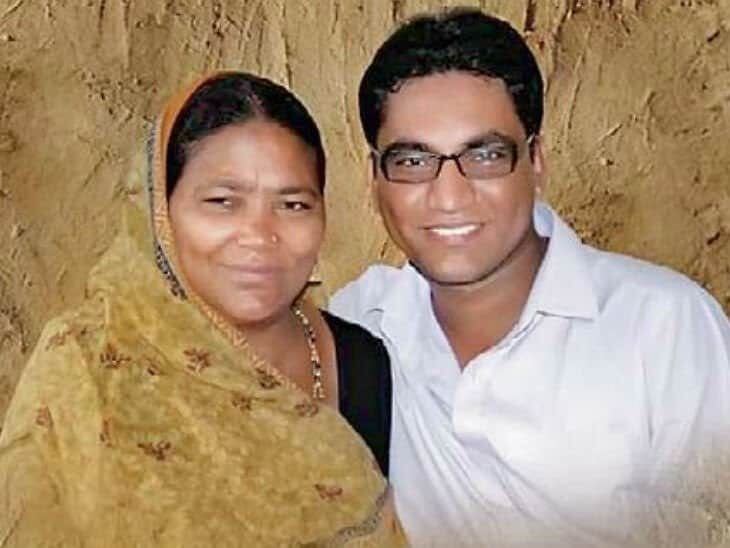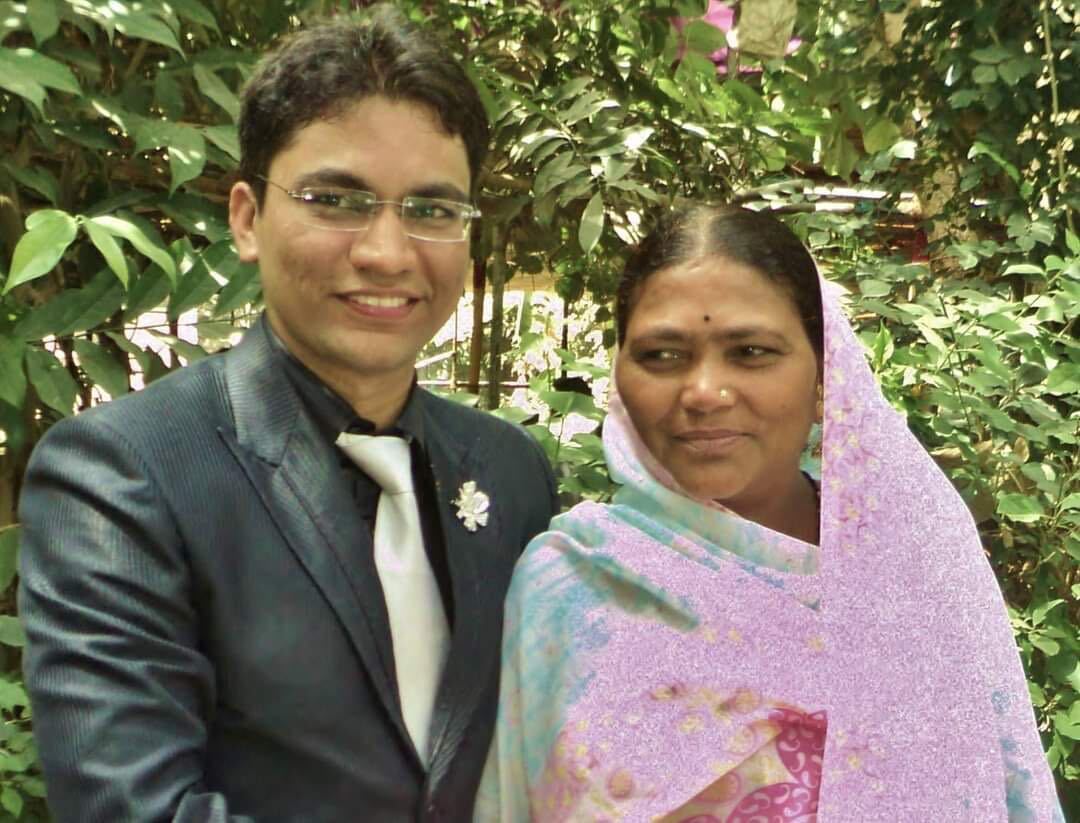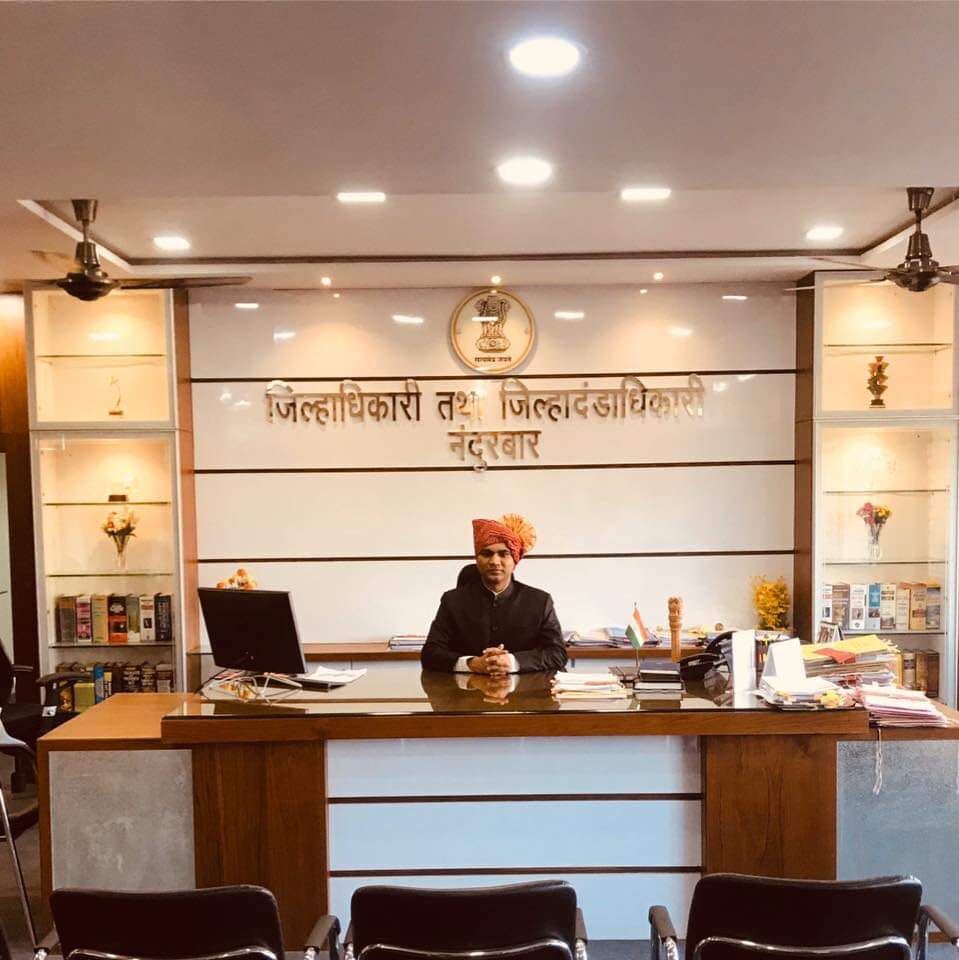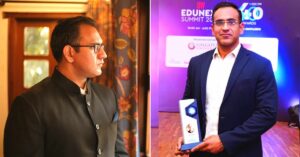Raised by a Single Mom in a Hut, This Inspiring Adivasi is a Doctor & an IAS!
“Since childhood, I have aimed to become a doctor so that I could help other people. But, as I grew up, I realised that to help people, I need to educate them and provide them with better opportunities.”

“Do not feel depressed about your situation in life. Do not think about only the problems. Think about solutions, and how you can overcome your problems. That will make you stronger. And it is the only way to move forward, and succeed,” mentions Dr Rajendra Bharud, the District Magistrate of Nandurbar district in Maharashtra.
Born on January 7, 1988, in the small village of Samode village in Sakri Taluka, Dr Rajendra is among three children born to Bandu Bharud and Kamalabai. His father passed away while his mother was pregnant with him, and he says that till date, he doesn’t know what his father looked like.
“My family was so poor that we could not afford to get even a single picture of him clicked before he passed. Poverty is what we have known since birth. It is etched so deep within every person in the village that no one realises they are poor or illiterate. Each person is happy with what they have, and by living on nature’s resources.”
His mother, whom he refers to as Maai, and his grandmother were the ones who ran the household and raised the three children. They earned their livelihood by selling desi wine, and the entire family stayed under one small hut made from sugarcane leaves.

“They prepared traditional liquor using Mahua flowers, commonly found in that tribal belt of Maharashtra. The extraction, fermentation, and distillation happened at home. It is not considered illegal because it is very common in that area. Men in the block would visit our sugarcane straw hut to have a glass of wine along with some chakna (snacks). Keeping customers happy was Maai’s priority. So if I would start crying she would feed me a teaspoon of the same, and put me to nap,” he says with a laugh.
On an average day, his family earned Rs 100. This would have to be used for their daily expenses, for making wine, and for education. Rajendra and his sister studied at the Zilla Parishad school in the same village while his brother studied a local tribal school.
Rajendra was in Class 5 when his teachers realised that he was an unusually intelligent child, and informed his mother that to harness his immense potential they needed to ensure that he completed his higher education in a better institution.
“While my mother continued the wine business, I moved to a Jawahar Navodaya Vidyala school, a CBSE board, which was 150 kilometres away from my village. In these schools promising students from rural areas are given free accommodation, and schooling. When I left, I cried and so did Maai. But she knew this was best for my future, and so did I. When I was at home for vacations, I would help her with business. She never allowed me to make the wine, but I would serve it to the customers.”
A New Beginning for Rajendra
Rajendra’s time at the Navodaya school changed his life. It was here that he developed a passion for Math and Science. He was always among the top performers — in the 10th board exams he topped both the subjects and two years later, in his 12 board examinations, he topped the class. Consequently, he went on to secure a merit scholarship and admission at the Seth GS Medical College in Mumbai.
“Since childhood, I had dreamed of becoming a doctor so that I could help other people. But, as I grew up, I realised that to help people, I need to educate them and provide them with better living opportunities. To do this, I had to become a civil servant,” says Dr Rajendra.
So, the MBBS student decided to begin studying for the UPSC exams. This was no easy task, but Rajendra powered through. He began by developing a fixed daily routine and claims he worked like a programmed computer. He would wake up at 5 AM, do some exercises or meditation, start studying, attend classes, and come back to study some more.
“I never did anything that a normal college student would do. No outings, no dates, and no partying. Though I had friends who would ask me to head out with them, I was very focussed on changing my future and the future of others. So, I never regretted not being part of that,” says Dr Rajendra.
In the final year of medicine, along with his MBBS exam, he also wrote his UPSC exam and cleared it in the first attempt. When his UPSC results were announced, Dr Rajendra was back in his village, and his mother had no idea that her son was now a civil officer.
“Until my results were announced, my mother was under the impression that her son was a doctor. When I told her I am going to become a collector, she did not know what it meant. For that matter, no one in my village knew who was a collector. As the word spread about me clearing a civil service exam, I was approached by neighbours, and they congratulated me for becoming a ‘conductor,’” he says with a smile.

Fulfilling his IAS dream
In 2012, he was posted as an IRS officer in Faridabad, and during his time there he also gave his second attempt at the UPSC exams. Once he cracked that, he was selected for the post of an IAS officer, underwent training for the next two years at Mussoorie. In 2015, he was posted as the Assistant Collector and Project Officer at Nanded district, and in 2017, he was posted as the Chief Executive Officer of Solapur. Finally, in July, 2018 he was made the District Magistrate of Nandurbar.
Dr Rajendra has also authored a Marathi book, Mi Ek Swapn Pahil (2014) where he described his struggles, journey, and the sacrifices his mother had made to raise three children. Today, he lives with his mother, wife, and children in the government quarters, and continues to do great things.

Once he was made the District Magistrate of Nandurbar, he launched many initiatives for the development of tribal and rural people, including one that brought more than 40,000 families under the ration scheme and enrolled more than 65000 rural people under the Mahatma Gandhi National Rural Employment Guarantee Act (MGNREGA).
He also took up schemes under the Swachh Bharath Abhiyan initiative, which included beautifying plantations in his jurisdiction.
During his time as the Zilla Parishad officer in Solapur, he introduced a sewer system that would eliminate open drains. The model involved creating soak-pits where waste-water would get collected and treated, before being allowed to enter the ground.
This not only fixed open drains but also saw an increase in the water table. He won an award for the same from Uma Bharthi, the former Minister of Drinking water and Sanitation.
Last year, he was also asked to present this model at IIT- Madras.
Despite all of these, he feels the one achievement which stands above the rest in his career is being made the Chairman of his own school — Jawahar Navodaya, Akkalkuva Taluka.
Surendra Deore, a science teacher at the school, has been teaching there since 1988. He played a major role in enrolling Rajendra into the school, and says, “ I am so proud to have one of my own students as my chairman. He was a very kind, and studious boy. He would mingle with everyone, and participate in all sorts of activities which the school conducted. During the day, he had a set of friends in school with whom he would study and enjoy, and after school he had another peer group with whom he would do the same. I have never seen him be unproductive, as far as I can remember,”
His current work
Currently, his work revolves around tackling the COVID-19 situation by setting up block-level treatment facilities, creating awareness among people to follow social distancing, and wearing masks. “Coming from a medical background, I understood that early detection, isolation, and treatment was the only solution to curb the spread of the virus. Also, the issues of shortage of doctors and nurses were addressed at an early stage, hence fatality rate was comparatively low.”
Dr Rajendra’s journey towards becoming an IAS officer is a shining example of determination and single-minded focus, and nothing short of inspirational, but he wears the praise lightly. “It wasn’t easy, but I was willing to put in the hard work, and it got me through,” he concludes.
(Edited by Gayatri Mishra)

Similar Story

Ex-IRS Officer’s Free UPSC CSE Course Eliminates Need for Paid Coaching
An IRS officer-turned-educator, Ravi Kapoor has mentored thousands of UPSC aspirants for free. Taking upon his 10 years of bureaucratic experience and masters in clinical psychology, Ravi’s approach to UPSC mentorship has always kept mental fitness and motivation in focus.
Read more >
If you found our stories insightful, informative, or even just enjoyable, we invite you to consider making a voluntary payment to support the work we do at The Better India. Your contribution helps us continue producing quality content that educates, inspires, and drives positive change.
Choose one of the payment options below for your contribution-
By paying for the stories you value, you directly contribute to sustaining our efforts focused on making a difference in the world. Together, let's ensure that impactful stories continue to be told and shared, enriching lives and communities alike.
Thank you for your support. Here are some frequently asked questions you might find helpful to know why you are contributing?


This story made me
-
97
-
121
-
89
-
167












